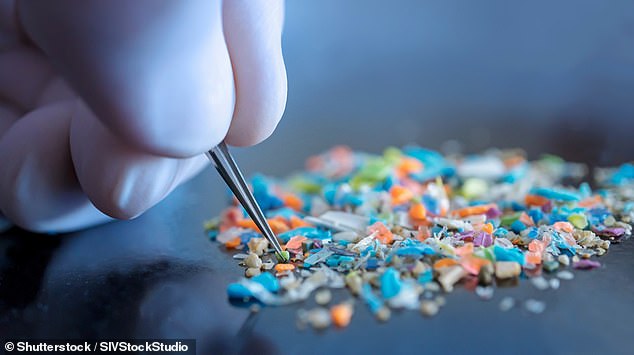Microplastics in food, water and even in the air we breathe could cause deadly blood clots to form in the brain, a group of experts have discovered.
This could increase the risk of strokes and psychiatric illness such as depression, the Chinese researchers suggested.
The findings raised concerns that the tiny particles — which ‘shed’ from plastic items into food or the environment — could also be linked to the development of dementia.
Microplastics are small enough to enter the micro-circulation within the brain.
Once inside, they trigger an immune system reaction that leads to the formation of clots, which the restrict the flow of blood.
Tests on mice injected with microplastics found those that developed these clots displayed signs of ‘neurological impairment’.
Scientists have found microplastics in human brain tissue before but the exact mechanism of how these tiny particles causing damage was unknown.
Restricted blood flow to the brain is a known cause of vascular dementia though the new study, published in Science Advances, did not look at this specifically.

Lead author Haipeng Huang, an expert in environmental sciences at Peking University, said the results were concerning and warranted for further research on monkeys to more closely mimic what might be happening in humans.
‘The potential long-term effects of [microplastics] on neurological disorders such as depression and cardiovascular health are concerning,’ he wrote.
‘This study offers a theoretical foundation and a focused direction for understanding the potential health risks.
‘Increased investment in this area of research is urgent and essential.’
In the study itself, experts injected mice with special fluorescent microplastics and then used complex imaging technology to track the particles’ infiltration of the brain and how they interacted with the immune system.
They also had mice perform a number of mental tests designed to assess if the microplastics were affecting their ability to think.
Mice with the clots were found to perform worse on remembering the layout of a maze and had decreased motor function.
It’s not the first study to link microplastics, which are less than 5mm in size, to brain damage and dementia.



Another study on mice, conducted in 2022, found microplastics provoke chronic inflammation in the organ that can damage brain cells.
And analysis on human corpses last year found people who had died with dementia had 10-times the amount of microplastics by weight than healthy people, though this study was small with only 12 patients with the condition.
While the long-term affects of microplastics on human health remain unclear concern is rising in part because avoiding them is almost impossible.
A recent study even found a single tea bag could release billions of dangerous microplastics into the body.
Microplastics are in the air, water, food, cosmetics and clothing and have been found in variety of human tissue including the intestines and even in men’s sperm.
There is a growing body of evidence that plastics could play a key role in early-onset cancer genesis, where healthy cells turn cancerous.
Earlier this year, a study found cancer cells in the gut spread at an accelerated rate after contact with microplastics.
Experts have also raised the alarm about a potential between microplastics and reproductive health.
Around 944,000 in the UK are thought to be living with dementia while the figure is thought to be around 7million in the US.
Dementia is incurable and has a variety of causes, with Alzheimer’s disease and the vascular form of the disorder being among the most common.
Memory problems, thinking and reasoning difficulties and language problems are common early symptoms of dementia, which then worsen over time.
A separate Alzheimer’s Research UK analysis found 74,261 people died from dementia in 2022 compared with 69,178 a year earlier, making it the country’s biggest killer.
This post was originally published on here







